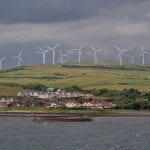Around The Web
Tougher EU CO2 goal will triple EUA price, Eastern energy sector warns as top Polish coal plant slated to shut
California power sector emissions cratered during COVID-19 lockdown, data shows
Inflexible nuclear blamed for big cuts in wind power in UK
 Lack of flexibility of nuclear plants is biggest cause of wind constraints in UK, at a cost of more than $180 million a year.
Lack of flexibility of nuclear plants is biggest cause of wind constraints in UK, at a cost of more than $180 million a year.
The post Inflexible nuclear blamed for big cuts in wind power in UK appeared first on RenewEconomy.
Curious kids: How far away can dogs smell and hear?
ECB to expand green bonds portfolio, but issues call for EU nations’ support
Associate, Carbon Management, US Climate, World Resources Institute – Washington DC
NA Markets: RGGI allowances climb toward reserve trigger price after Q2 sale
RFS Market: RIN prices fall back from two-year highs
'More masks than jellyfish': coronavirus waste ends up in ocean
A glut of discarded single-use masks and gloves is washing up on shorelines and littering the seabed
Conservationists have warned that the coronavirus pandemic could spark a surge in ocean pollution – adding to a glut of plastic waste that already threatens marine life – after finding disposable masks floating like jellyfish and waterlogged latex gloves scattered across seabeds.
The French non-profit Opération Mer Propre, whose activities include regularly picking up litter along the Côte d’Azur, began sounding the alarm late last month.
Continue reading...EU Midday Market Briefing
Oil, gas and coal facing terminal decline and massive plunge in value
 “We are witnessing the decline and fall of the fossil fuel system" as impact of Covid-19 pandemic to accelerate losses, write-offs and bankruptcies in coal, gas and oil.
“We are witnessing the decline and fall of the fossil fuel system" as impact of Covid-19 pandemic to accelerate losses, write-offs and bankruptcies in coal, gas and oil.
The post Oil, gas and coal facing terminal decline and massive plunge in value appeared first on RenewEconomy.
Small boats and female workers hardest hit by Covid-19 fisheries impact
Research shows how supply chains around world have been disrupted by pandemic
Small fishing boats, fish markets and female workers are among the categories worst affected by the economic impact of the coronavirus crisis on the world’s fisheries, research has found.
Supply chains around the world have been disrupted by the Covid-19 pandemic, and artisanal fishing – small boats – has borne the brunt, according to the annual report on fisheries by the UN Food and Agriculture Organisation (FAO). While industrial fishing fell only by about 6.5% in April, a large proportion of small vessels around the world have been in effect confined to port, and their markets are uncertain.
Continue reading...ANALYSIS: Virus crisis puts pause on voluntary carbon market’s rapid expansion
'It was hell': Spanish cocaine raid adds to shipboard misery for 4,000 cows
Terrible conditions witnessed onboard livestock ship travelling from Colombia to Egypt suspected of being a cover for trafficking
When the Neameh sailed out of Colombia on 4 May, it should have been a routine shipment: just over 4,000 cows, on their way to Egypt, an important hub for the global trade in live animal exports.
But accusations of cocaine smuggling and a police raid of the ship lengthened the journey.
Continue reading...Only two-thirds of UK bathing waters rated excellent in EU survey
Latest data puts Britain near bottom of Europe’s league table for bathing water quality
Swimmers itching to take advantage of the easing of lockdown to have their first sea bathes or wild swims of the summer should pick their spot wisely: only two-thirds of the UK’s bathing waters are of excellent quality, according to the latest data, putting Britain near the bottom of Europe’s league table for bathing water quality.
Most of the rest of the UK’s beaches were of good or sufficient quality last year, with fewer than one in 20 judged to be poor, in the annual survey by the European Environment Agency.
Continue reading...Delivery to Australia’s ERF tops 55 million offsets, issuances steady
Commonwealth nations to protect coral reefs with satellite technology
Countries to use high-resolution images to monitor health of marine resources
Commonwealth countries are to gain free access to satellite technology that will help them monitor and protect their endangered coral reefs from threats such as climate breakdown, overfishing and pollution.
Commonwealth countries hold nearly half of the world’s remaining tropical coral reefs, with 47 out of the 54 member countries having a coastline. Nearly half of them are islands or groups of islands, which face particular threats from the climate crisis, and for whom coral reefs are often vital protections against storms as well as fish nurseries and tourist attractions.
Continue reading...Pinkest flamingos fight the hardest for food, scientists learn
Bright plumage linked to aggression when squabbling with rivals
The pinkest flamingos are also the most aggressive when it comes to squabbling over food, scientists have found.
Research from the University of Exeter also suggests bright pink plumage to be an indicator of good health in lesser flamingos.
Continue reading...


